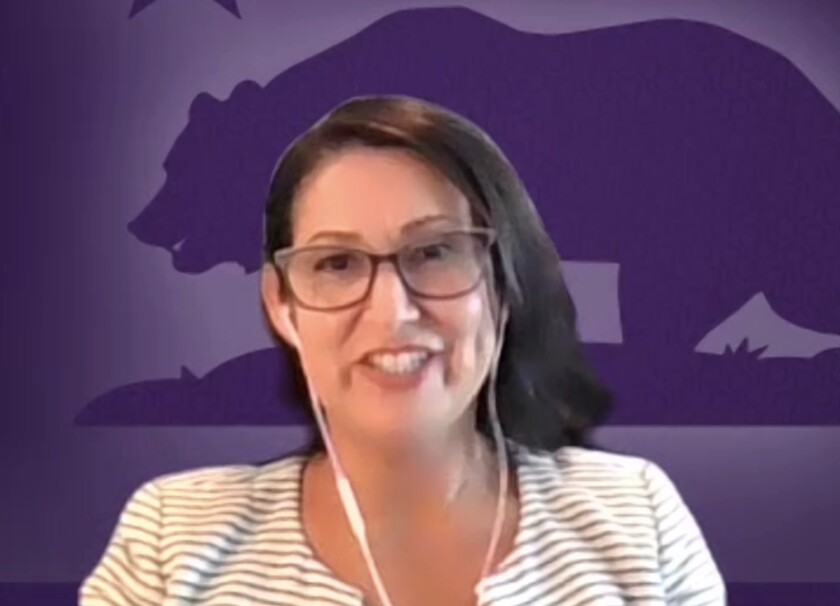U.S. Rep. Scott Peters (D-La Jolla) marked national Alzheimer’s & Brain Awareness Month by presenting a June 9 webinar that included remarks by three local experts on the disease.
Peters, a member of the House Democratic Caucus task force on aging and families and the bipartisan congressional task force on Alzheimer’s disease, said Alzheimer’s is the third-leading cause of death in San Diego County and that nearly 100,000 people countywide are living with Alzheimer’s or dementia.
“Family members often take on the responsibility [of caring for those afflicted with Alzheimer’s] without any formal guidance or support that can affect their own financial security,” Peters said. “It’s my hope that families watching right now can learn more about the work of our local research community [and] how to access resources that you might need to help manage the disease.”
The webinar was planned long before the June 7 announcement that the U.S. Food and Drug Administration approved the Biogen drug Aduhelm (aducanumab) for treatment of Alzheimer’s. It is the first drug approved for the disease in 18 years, and webinar panelists were quick to discuss the implications.

Dr. James Brewer says “there’s still a lot of work to be done” to research Alzheimer’s disease.
(Elisabeth Frausto)
“There was a lot of controversy about whether this drug actually is going to be the one that halts the disease in any significant manner,” said Dr. James Brewer, chairman of the neurosciences department at the Shiley-Marcos Alzheimer’s Disease Research Center and director of the Alzheimer’s Disease Cooperative Study Imaging Core at UC San Diego.
Brewer said Aduhelm works to remove amyloid, a protein that ravages the brains of Alzheimer’s patients. But the drug doesn’t address the nerve degeneration process, he added.
Aduhelm therefore will only “slightly delay the progression of the illness,” Brewer said, but it’s getting “something out there for the patients.”
“There’s a lot of components to this disease,” he said. “It’s not as simple as remove amyloid and everything’s done. There’s still a lot of work to be done, but we’re excited about [the] announcement. We’re really tooling up to be able to deliver the infusion approach that this new drug … offers.”

Ana González Seda says early detection and diagnosis of Alzheimer’s is important.
(Elisabeth Frausto)
Ana González Seda, director of programs for the San Diego/Imperial chapter of the Alzheimer’s Association, said her office has been flooded with questions about Aduhelm. “We definitely welcome and celebrate the FDA approval,” she said.
She said there are unanswered questions about the drug’s cost, who will be granted access to it and how it fits with other therapies for Alzheimer’s. She encouraged webinar participants to check the association’s website, alz.org, for updated information.
“Although this new drug is not a cure, it has taken us in the right direction so we can be able to have more of those conversations” about brain health, Seda said.
Brewer said his team and that of Dr. Jerold Chun, senior vice president of neuroscience drug discovery for the Center for Genetic Disorders and Aging Research at the Sanford Burnham Prebys Medical Discovery Institute in La Jolla, are collaborating to research all treatment options as well as address the nerve degeneration component of Alzheimer’s.
“There’s incredible synergy that occurs throughout the San Diego search community,” Chun said. After decades of research on Alzheimer’s, “we’re still at the stage where we don’t quite understand how this all works,” he said.
Seda advised daily exercise and a balanced diet to help stave off onset of Alzheimer’s symptoms.
Staying socially active with friends and family also can help prevent cognitive decline, she said.
“Everything your body does is tied into your brain,” Chun said. “There’s a documented benefit that includes lifestyle changes to improve the odds that you’ll keep your brain healthy. … Exercise can be preventative” for Alzheimer’s.
Brewer said he is trying to launch a study at UCSD “to really try to get at the true interventions that are science-supported to increase health span.”
Chun said a common question is, “If your parents have [Alzheimer’s], [are you] going to get it? I think something that needs to be really stressed is no, that is not the case. In fact, the familial forms of the disease are extremely rare.”
For people who are concerned that a family member might have Alzheimer’s, Seda said early detection and diagnosis is “key in introducing therapy in their life.”
“We’re really advocating for constituents to talk to their health care provider right away if they’re experiencing some symptoms, if you know something’s just not making sense in their lives,” she said. ◆
"local" - Google News
June 14, 2021 at 12:00AM
https://ift.tt/3wnaPA7
‘Still a lot of work to be done’: Local experts discuss Alzheimer’s research, treatment and support - La Jolla Light
"local" - Google News
https://ift.tt/2WoMCc3
https://ift.tt/2KVQLik
Bagikan Berita Ini














0 Response to "‘Still a lot of work to be done’: Local experts discuss Alzheimer’s research, treatment and support - La Jolla Light"
Post a Comment